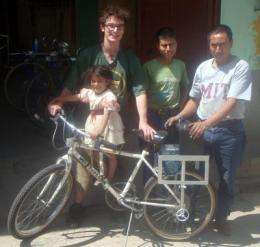Student uses pedal power to create novel machine

An innovative bicycle-powered water pump, created by a student at the University of Sheffield, has proved a huge success and is now in regular production in Guatemala, transforming the lives of rural residents.
Jon Leary, 24, a MEng student in the University's Department of Mechanical Engineering, took his bicycle machine design from a Steel City drawing board to the heart of Guatemala as part of his dissertation, which required him to 'make something useful out of rubbish.'
During his four month stint in Guatemala, Jon spent time improving the design for his bicibomba movil - a mobile bicycle-powered water pump to be used for irrigation and general water distribution - by working with the Guatemalan NGO Maya Pedal, who design and build a variety of weird and wonderful bicycle machines using abandoned bikes sent over from the US and Canada. Maya Pedal's aim is to produce machines which can improve the daily lives of locals, without them having to resort to expensive electrical or environmentally damaging fossil fuelled machines. Their machines, which are human-powered sustainable energy sources, range from the bicilavadora (bicycle washing machine) to the bicimolino (corn grinder).
Jon created the machine using a normal bike, which is plugged into a frame with an old electrical pump converted to a friction drive attached to the back wheel. The back tyre of the bike makes direct contact with the former armature of the motor, which is covered with rubber from an old tyre to give better grip. The machine was tested to a range of heights and on flat ground the pump can achieve a 40 litres per minute flow rate - equal to about three normal showers. At 26 meters, a flow rate of 5 liters per minute can be achieved.
The bike frame can be built quickly and easily using only basic workshop tools and materials, including a few lengths of angle iron, some flat lengths of metal, bicycle seat posts and seat tubes, and a scrapped standard electric centrifugal water pump.
Prior to Jon's design, Maya Pedal had already produced a popular machine capable of drawing water from up to 30m below the surface, however many farmers lived on steep inclines and wanted to distribute the water once it had been extracted from the well. As a result, unlike Maya Pedal's other static designs, Jon's bike is completely mobile - when a person is done pumping, they can simply flip the frame upside down and it will sit on top of the back wheel like a pannier rack. This mobility enables users to pump from the bottom of the hill to a mid-way tank until full, and then continue pumping from the mid-way tank to the top of the hill. The number of mid-way tanks can be increased indefinitely, effectively making the pumping distance unlimited.
The machine is now in regular production in Guatemala and at least six more models have been made since Jon's departure from the country last summer. Jon has since produced an open source construction manual for the machine, which is freely available on Maya Pedal's web site. The manual was recently sent to Malawi by students from the University of Strathclyde involved in a rural irrigation project aiming to address some of the agricultural problems that the developing nation is facing.
In two months time, Jon will return to Guatemala with a team of three more of the University's recent graduates from the Department of Mechanical Engineering to design, build and test a wind turbine. The turbine will be designed specifically for Maya Pedal and as a result will be constructed from disused bicycle parts and other scrap materials.
Jon said: "When I was asked to design a novel product from waste material for my Master's thesis, I never would have expected that I'd end up welding together bicycle machines in the highlands of Guatemala! Working at Maya Pedal was like being on Scrapheap Challenge - there is a storeroom full of stripped down bicycle parts, a workshop full of tools and the only limit is your own imagination. There was never a dull day, the volunteers came from all around the world to be there and everyone in the local town was so friendly - it's certainly an experience I'll never forget."
Dr Steve Bradbury from the Department of Mechanical Engineering at the University of Sheffield, said: "It is gratifying to see that the design expertise that we foster in our students can be utilised in worthy projects such as this. It is a result where everybody wins; Jon, the University and most importantly, the people of Guatamala."
Provided by University of Sheffield



















